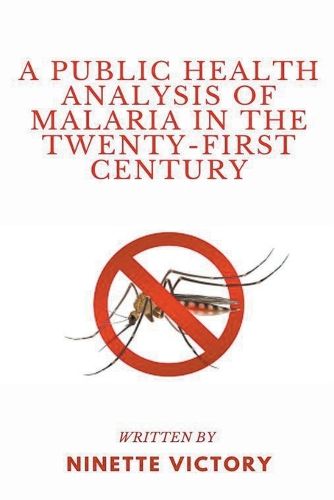Readings Newsletter
Become a Readings Member to make your shopping experience even easier.
Sign in or sign up for free!
You’re not far away from qualifying for FREE standard shipping within Australia
You’ve qualified for FREE standard shipping within Australia
The cart is loading…






This title is printed to order. This book may have been self-published. If so, we cannot guarantee the quality of the content. In the main most books will have gone through the editing process however some may not. We therefore suggest that you be aware of this before ordering this book. If in doubt check either the author or publisher’s details as we are unable to accept any returns unless they are faulty. Please contact us if you have any questions.
In "A Public Health Analysis of Malaria in the Twenty-First Century," renowned public health specialist Ninette Victory unravels one of the world's most complex health issues. Malaria is closely linked to socio-economic, environmental, and global health dynamics, and modern public health views analyze it.
Victory begins by examining malaria's history and its effects on human communities. She then takes readers through cutting-edge malaria detection, treatment, and preventive studies. The book explores the complex link between malaria parasites, vectors, and vulnerable populations.
Victory's overall strategy distinguishes it. The author explores malaria's societal causes beyond its biology. Malaria's economic effects, healthcare system effects, and devastating effects on vulnerable groups are examined in detail.
Each chapter examines a key malaria issue and provides a path for the future. Victory carefully investigates how new technologies, strategies, and global cooperation might change malaria control.
The author faces obstacles head-on. Victory presents a multifaceted perspective of malaria's challenges, from afflicted communities' economic difficulties to healthcare system strain. The book ends with convincing policy proposals to help policymakers, public health authorities, and stakeholders accomplish dramatic change.
This book offers a complete reference to understanding and treating malaria in the modern era. Victory's writing simplifies hard public health issues for a wide audience. "A Public Health Analysis of Malaria in the Twenty-First Century" inspires global health advocates to work toward a malaria-free society.
$9.00 standard shipping within Australia
FREE standard shipping within Australia for orders over $100.00
Express & International shipping calculated at checkout
This title is printed to order. This book may have been self-published. If so, we cannot guarantee the quality of the content. In the main most books will have gone through the editing process however some may not. We therefore suggest that you be aware of this before ordering this book. If in doubt check either the author or publisher’s details as we are unable to accept any returns unless they are faulty. Please contact us if you have any questions.
In "A Public Health Analysis of Malaria in the Twenty-First Century," renowned public health specialist Ninette Victory unravels one of the world's most complex health issues. Malaria is closely linked to socio-economic, environmental, and global health dynamics, and modern public health views analyze it.
Victory begins by examining malaria's history and its effects on human communities. She then takes readers through cutting-edge malaria detection, treatment, and preventive studies. The book explores the complex link between malaria parasites, vectors, and vulnerable populations.
Victory's overall strategy distinguishes it. The author explores malaria's societal causes beyond its biology. Malaria's economic effects, healthcare system effects, and devastating effects on vulnerable groups are examined in detail.
Each chapter examines a key malaria issue and provides a path for the future. Victory carefully investigates how new technologies, strategies, and global cooperation might change malaria control.
The author faces obstacles head-on. Victory presents a multifaceted perspective of malaria's challenges, from afflicted communities' economic difficulties to healthcare system strain. The book ends with convincing policy proposals to help policymakers, public health authorities, and stakeholders accomplish dramatic change.
This book offers a complete reference to understanding and treating malaria in the modern era. Victory's writing simplifies hard public health issues for a wide audience. "A Public Health Analysis of Malaria in the Twenty-First Century" inspires global health advocates to work toward a malaria-free society.